Find out more about The Open University’s history courses.
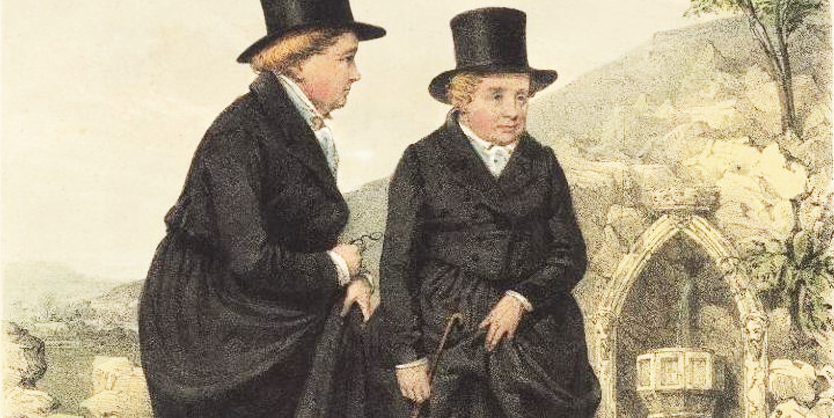 Eleanor Charlotte Butler and Sarah Ponsonby ran away from Ireland to escape the social pressures of conventional marriage. They arrived in Llangollen in 1778 and settled there as a couple, becoming famous throughout Europe as the 'Ladies of Llangollen'. Painting by J.H. Lynch c.1880 courtesy of Llyfrgell Genedlaethol Cymru /The National Library of Wales.
Eleanor Charlotte Butler and Sarah Ponsonby ran away from Ireland to escape the social pressures of conventional marriage. They arrived in Llangollen in 1778 and settled there as a couple, becoming famous throughout Europe as the 'Ladies of Llangollen'. Painting by J.H. Lynch c.1880 courtesy of Llyfrgell Genedlaethol Cymru /The National Library of Wales.
Some people think of history as something that should be confined to books and school lessons, something almost alien. The author L. P. Hartley called it, ‘a foreign country: they do things differently there.’
But in truth, history is all around us. It is today, because without the recording of actions of people now, there would be nothing to study in the future.
The way we record these actions – not just the big decisions, but the more modest actions too - is dependent on so many things. Still today, we are more likely to record the actions of people who are wealthier, more literate, and who benefit from more social capital and opportunities because of who they are.
The result is that many, many people are left out of history. For example, women’s history is a long way behind men’s history because opportunities were denied for them to work, travel, write and have their contributions acknowledged.
This empty space is widely recognised, and many people are trying to fill it, but other histories, particularly those of other minoritised groups, are even more hidden – or even forbidden. The history of disability, race, sexual orientation, and gender identity to name just a few, are lacking due either to open discrimination or the discrimination of disinterest.
Trying to address these omissions can be a difficult task. If people have not been written about, how do we find them?
The first place to start is recognising that some of the language we use today to describe different identities simply didn’t exist before the nineteenth century.
Finding these hidden histories requires what I call a patchwork approach.
The first place to start is recognising that some of the language we use today to describe different identities simply didn’t exist before the nineteenth century. So, if we can’t search key words and phrases, we need to think about what people are doing – not who they are.
For example, many individuals who might today identify as either lesbian or transmasculine were living as men. Women - because they would have been identified as women at the time- put on men’s clothes, adopted men’s mannerisms and functionally became men within society, taking ‘male jobs’ such as navvies, sailors, soldiers, and many areas of employment commonly reserved for men.
In her book, Penal Discipline, advocating reforms to the prison system, Mary Louisa Gordon (1861-1941), a British physician and prison inspector recalls:
I came across another young woman who was continually in prison for stealing men’s clothes. She had several long sentences. I asked her what would keep her out of prison, and she replied, “If I could go to sea.” On investigation I found that she felt it impossible to live as a woman, but could live as a man, and enjoyed men’s work.
I told her that there was no law against her wearing men’s clothing decently, if she did not steal it. After she had two more convictions, I fitted her out with the clothes she wanted, and paid her fare to South Wales. she got work in a night shift, and lay on her back in a coal-pit hewing coal.
This type of searching was covered in the research guide, Queering Glamorgan, which despite its title includes a methodology that can be applied anywhere. The book, A Practical Guide to Searching LGBQIA Historic Records, is also useful as a toolkit in research techniques.
When you apply this methodology, you start to see small stories appear. Many of them appear in the pages of newspapers past as fillers, those ‘and finally’ bits aimed at amusing or shocking the reader. In themselves, they often offer us little in terms of analysis and commentary but, stitched together, patterns begin to emerge.
All of these local stories add together to reflect the broad spectrum that is society. And what is true of LGBTQ+ histories are true of other identities, such as disabled histories. When researching some walking races in the early twentieth century, I came across a ‘peg-leg’ race about men with wooden prosthetics taking part in a race. It was a positive account - and we do need positive narratives from the past to add to our varied histories.
Moving away from mainstream narratives is important, because without proper representation, we cannot ever form an accurate picture of society.
For much of this we have to turn to local histories, and in order to facilitate that, the Welsh Government has funded extensive training in LGBTQ+ Language and History for local museums, libraries and archives in Wales.
The aims were to assist heritage organisations to search their own collections and to reach out to local communities for contemporary history. This resulted in a series of timelines being published in February 2023 with the intention to have LGBTQ+ timelines for all twenty-two counties in Wales by 2024 – these will be posted on various county websites but the map for the timelines will be on LGBTQ Cymru, a website concerned with all things Welsh LGBTQ+ history. These timelines follow a pan-Wales edition already published as a free download on RCT Pride’s website entitled, Welsh Pride.
The work on those local timelines is already proving successful with new stories trickling in. One notable example was that of someone who responded on social media to point out that a cousin of theirs, Brett Burnell, was discharged from the Royal Navy in 1993 for being gay. It was not illegal to be gay in the armed forces then, but it was deemed ‘incompatible’ with Ministry of Defence policy.
Brett was not willing to be treated in this manner, so he stood up and bravely challenged the Navy. Remember that this was at a time when declaring your homosexuality could make life extremely difficult. It became a feature of the Channel 4 documentary Cutting Edge: Navy Blues, all about naval discipline. Questions were even asked in the House of Commons.
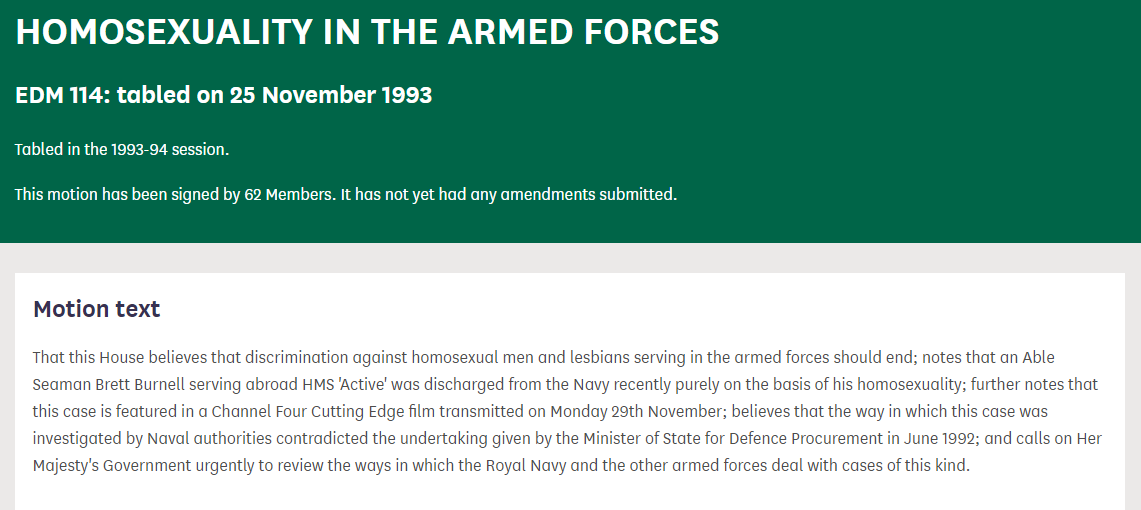 Early day motion tabled on 25 November 1993 in the UK Parliament House of Commons. EDMs are used to put on record the views of individual MPs or to draw attention to specific events or campaigns.
Early day motion tabled on 25 November 1993 in the UK Parliament House of Commons. EDMs are used to put on record the views of individual MPs or to draw attention to specific events or campaigns.
It took a further seven years before the ban was removed but Brett’s story is an important one, not just in the history of sexual orientation but in military history and social history.
Yet, for many of us studying Welsh LGBTQ+ history, this connection had passed us by. Even those of us whose lives revolve around research cannot cover everything and we need local people to draw our attention to these kinds of important events. Incidentally, the story came to me from a cousin who lives in Wales, while Brett now lives in London.
We often talk about ‘diversities’, as though they’re somehow separate from ‘the rest of us’. Many are referred to as ‘minorities’. But isn’t the truth that, in fact, there is a diversity about all of us? When we add together everyone’s minority diversity it makes the whole of society.
What’s different is how we treat these identities. Society minoritises them, but by bringing these hidden stories to the fore, we can celebrate all that which is so rich and beautiful about our society, and the many identities and experiences which make it what it is.
Indeed, the whole of society needs to be acknowledged and recognised – and included in the public galleries of our museums, libraries, and archives where so much diversity is still missing.
So, when you research and write your essays, novels, and books, bear this in mind and look for the people in the shadows of history.
They are always there.
About the author
Norena Shopland is a Welsh historian and writer who specialises in researching, recording and promoting LGBT+, women's and Welsh histories. Working closely with heritage organisations, she curates exhibitions on these subjects and is one of the founders of Hanes LHDT+ Cymru / LGBTQ+ Research Group Wales, which unites and supports LGBTQ+ history of Wales enthusiasts and researchers.
Books by Norena Shopland include A History of Women in Men's Clothes: From Cross-Dressing to Empowerment, Forbidden Lives: LGBT Stories from Wales and A Practical Guide to Searching LGBTQIA Historical Records (LGBTQ Histories.
Discover more on OpenLearn
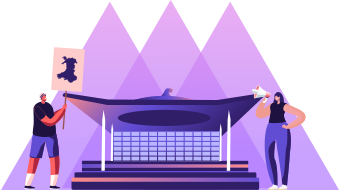
This resource is part of the Active Citizenship in Wales collection.
Discover more on the collection homepage.
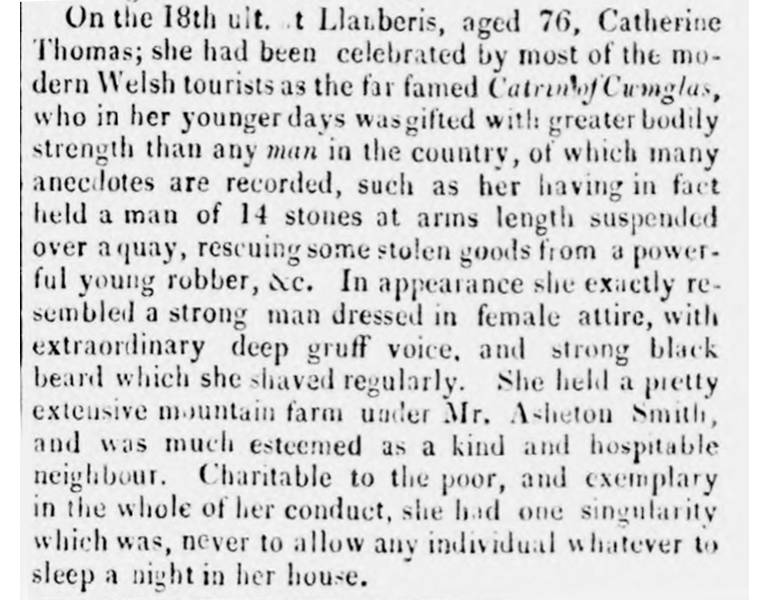
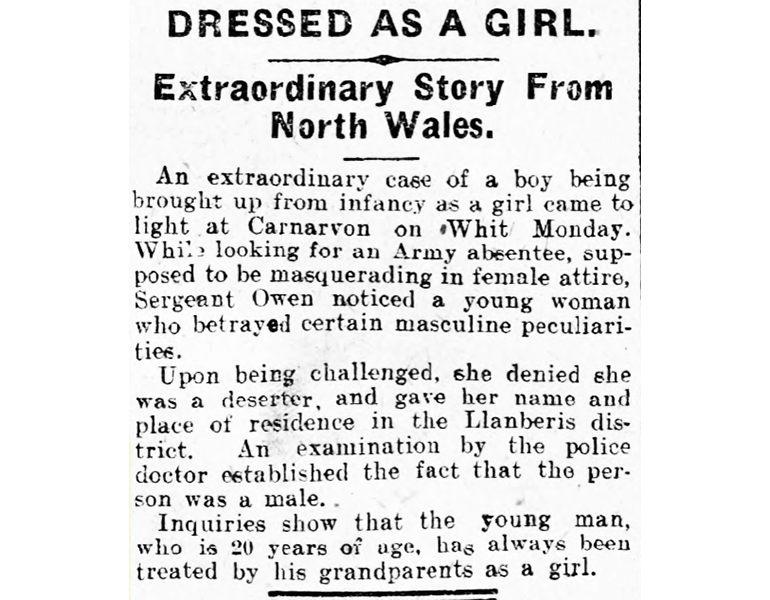


Rate and Review
Rate this article
Review this article
Log into OpenLearn to leave reviews and join in the conversation.
Article reviews